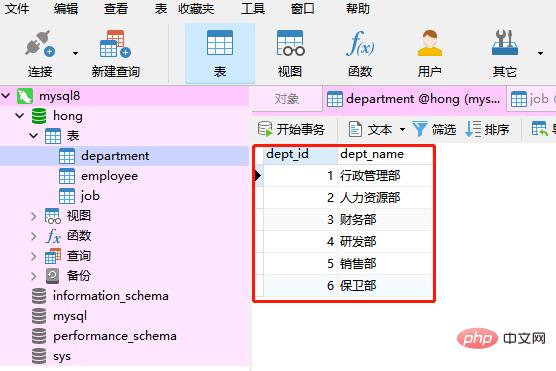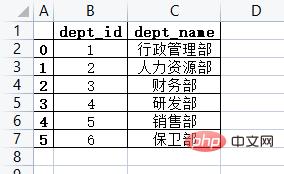 Backend Development
Backend Development
 Python Tutorial
Python Tutorial
 How to use three lines of Python code to import and export database and Excel?
How to use three lines of Python code to import and export database and Excel?
How to use three lines of Python code to import and export database and Excel?

Database->Excel

Let’s first take a look at the department table in the database. There are six pieces of data in this table, representing different departments.
Next, take a look at this Python code. First, import the library you need to use, SQLAlchemy, which is the most famous ORM tool in Python.
The full name is Object Relational Mapping.
Why use SQLAlchemy?
It abstracts your code from the underlying database and its associated SQL features.
The characteristic is to manipulate Python objects instead of SQL queries, that is, objects are considered at the code level instead of SQL. It embodies a kind of programmatic thinking, which makes Python programs more concise and easy to read.
The specific usage is as follows:
from sqlalchemy import create_engine
import pandas as pd
# 创建数据库连接
engine = create_engine('mysql+pymysql://root:211314@localhost/hong')
# 读取mysql数据
db = pd.read_sql(sql='select * from hong.department', con=engine)
# 导出数据到excel
db.to_excel('部门数据.xlsx')
The first line of code is to first create a connection to the database.
My mysql username is root and the password is 211314.
Because I am starting the local database service here, it is localhost.
The slash is followed by the name of the database hong
The second line of code is to use pandas's read_sql() to query the data in the mysql table department
The second line The code is to write the queried data to the local through to_excel() of pandas
The execution result is successfully written to the local excel file

Excel->Database
Next let’s look at how to write local xlsx data into a mysql file.
from sqlalchemy import create_engine
import pandas as pd
# 创建数据库连接
engine = create_engine('mysql+pymysql://root:211314@localhost/hong')
# 读取xlsx文件
df = pd.read_excel('模拟数据.xlsx')
# 导入到mysql数据库
df.to_sql(name='test_data', con=engine, index=False, if_exists='replace')
The same first line of code is to first create a connection to the database
The second line of code uses pandas's read_excel() to read the local file. As follows:
This is one hundred pieces of data that I simulated using python’s faker

The third step uses the to_sql() method of pandas to read The obtained data is written into mysql
After the code execution is completed, I return to my hong database in mysql and find that there is an extra table of test_data.
Open it and take a look. Then this data is the same as the local data.
so. Here we use three lines of code to import data from the database to excel, and another three lines of code to import data from excel to the database.
To summarize:
Two-way data import can be achieved with only 3 lines of code.
Import data from the database to excel:
1. Use sqlalchemy to create a database connection
2. Use pandas’ read_sql to read the database data
3 , Use pandas' to_csv to store data into a csv file
Import data from excel to the database:
1. Use sqlalchemy to create a database connection
2. Use pandas' read_csv to read Get the csv data
3. Use pandas’ to_sql to store the data into the database a
The above is the detailed content of How to use three lines of Python code to import and export database and Excel?. For more information, please follow other related articles on the PHP Chinese website!

Hot AI Tools

Undresser.AI Undress
AI-powered app for creating realistic nude photos

AI Clothes Remover
Online AI tool for removing clothes from photos.

Undress AI Tool
Undress images for free

Clothoff.io
AI clothes remover

Video Face Swap
Swap faces in any video effortlessly with our completely free AI face swap tool!

Hot Article

Hot Tools

Notepad++7.3.1
Easy-to-use and free code editor

SublimeText3 Chinese version
Chinese version, very easy to use

Zend Studio 13.0.1
Powerful PHP integrated development environment

Dreamweaver CS6
Visual web development tools

SublimeText3 Mac version
God-level code editing software (SublimeText3)

Hot Topics
 1663
1663
 14
14
 1419
1419
 52
52
 1313
1313
 25
25
 1263
1263
 29
29
 1236
1236
 24
24
 PHP and Python: Different Paradigms Explained
Apr 18, 2025 am 12:26 AM
PHP and Python: Different Paradigms Explained
Apr 18, 2025 am 12:26 AM
PHP is mainly procedural programming, but also supports object-oriented programming (OOP); Python supports a variety of paradigms, including OOP, functional and procedural programming. PHP is suitable for web development, and Python is suitable for a variety of applications such as data analysis and machine learning.
 Choosing Between PHP and Python: A Guide
Apr 18, 2025 am 12:24 AM
Choosing Between PHP and Python: A Guide
Apr 18, 2025 am 12:24 AM
PHP is suitable for web development and rapid prototyping, and Python is suitable for data science and machine learning. 1.PHP is used for dynamic web development, with simple syntax and suitable for rapid development. 2. Python has concise syntax, is suitable for multiple fields, and has a strong library ecosystem.
 PHP and Python: A Deep Dive into Their History
Apr 18, 2025 am 12:25 AM
PHP and Python: A Deep Dive into Their History
Apr 18, 2025 am 12:25 AM
PHP originated in 1994 and was developed by RasmusLerdorf. It was originally used to track website visitors and gradually evolved into a server-side scripting language and was widely used in web development. Python was developed by Guidovan Rossum in the late 1980s and was first released in 1991. It emphasizes code readability and simplicity, and is suitable for scientific computing, data analysis and other fields.
 Python vs. JavaScript: The Learning Curve and Ease of Use
Apr 16, 2025 am 12:12 AM
Python vs. JavaScript: The Learning Curve and Ease of Use
Apr 16, 2025 am 12:12 AM
Python is more suitable for beginners, with a smooth learning curve and concise syntax; JavaScript is suitable for front-end development, with a steep learning curve and flexible syntax. 1. Python syntax is intuitive and suitable for data science and back-end development. 2. JavaScript is flexible and widely used in front-end and server-side programming.
 How to run sublime code python
Apr 16, 2025 am 08:48 AM
How to run sublime code python
Apr 16, 2025 am 08:48 AM
To run Python code in Sublime Text, you need to install the Python plug-in first, then create a .py file and write the code, and finally press Ctrl B to run the code, and the output will be displayed in the console.
 Oracle's Role in the Business World
Apr 23, 2025 am 12:01 AM
Oracle's Role in the Business World
Apr 23, 2025 am 12:01 AM
Oracle is not only a database company, but also a leader in cloud computing and ERP systems. 1. Oracle provides comprehensive solutions from database to cloud services and ERP systems. 2. OracleCloud challenges AWS and Azure, providing IaaS, PaaS and SaaS services. 3. Oracle's ERP systems such as E-BusinessSuite and FusionApplications help enterprises optimize operations.
 Golang vs. Python: Key Differences and Similarities
Apr 17, 2025 am 12:15 AM
Golang vs. Python: Key Differences and Similarities
Apr 17, 2025 am 12:15 AM
Golang and Python each have their own advantages: Golang is suitable for high performance and concurrent programming, while Python is suitable for data science and web development. Golang is known for its concurrency model and efficient performance, while Python is known for its concise syntax and rich library ecosystem.
 Golang vs. Python: Performance and Scalability
Apr 19, 2025 am 12:18 AM
Golang vs. Python: Performance and Scalability
Apr 19, 2025 am 12:18 AM
Golang is better than Python in terms of performance and scalability. 1) Golang's compilation-type characteristics and efficient concurrency model make it perform well in high concurrency scenarios. 2) Python, as an interpreted language, executes slowly, but can optimize performance through tools such as Cython.



